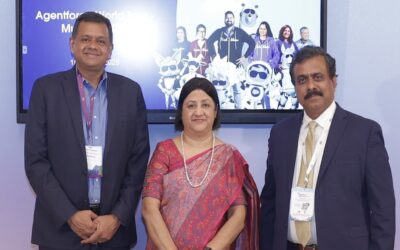Everyone talks about digital transformation, but few know how to get there. Transition is the key and organisations must become software companies. The Modern Software Factory is an approach to faster transformation, says Stephen Miles, CTO, APJ, CA Technologies — in an exclusive interview with Brian Pereira of Digital Creed.
DC: Organisations are struggling with digital transformation. How are you helping these organisations with software factory? How do you accelerate this transformation without compromising security?

Stephen Miles, CTO, APJ, CA Technologies
Stephen Miles: You know digital transformation means different things to different companies. At its most simplified form, it is in essence, the desire to change from where they are, to where they think they need to be. That results in a body of work which they need to go through to make that change. But they realise that it’s not a project; it doesn’t have a start or an end. It’s actually a body of change that you need to go through that gets them to an ability where they need to have a continual ability to adapt and change. And that’s why we use the mantra about moving from being built-to-last to being built-to–change. The key to having continuous adaptability is the new modus operandi that all organisations need to have. But that’s pretty difficult to take to a board, particularly for a lot of corporations, and today’s enterprises that are already struggling in their traditional markets. They are constrained around what they can spend; they are faced with lots of issues around compliance and other things which govern and control them, and now we need to go to the board and say: Hey, by the way we need to spend a ton of money to be continually different moving forward and by the way, we’re not that today. And that’s hard to swallow. The boards quite rightly turn around and say: Great help me understand what you need. Where does it start? Where does it end? The challenge is that companies are struggling to understand ‘how to’ — they understand the ‘what’.
DC: Can you please elaborate on the ‘how to’ part of the board’s question?
Stephen Miles: The ‘how’ is the problem. Where do we start and what are the highest priorities? How do we build something which has a continual value as opposed to just having a start and an end? How do we do it with some sense of concurrency, because doing this sequentially isn’t going to work that well, and frankly we don’t have the time. Yet how can it be pragmatic because the reality is I need to change from where I am at, I can’t just necessarily go and invest in a whole new adaptable business; it just doesn’t work that way. So, transition is key. And the modern software factory that you heard us talk a lot about at CA World was essentially to portray the ‘how’ in digital transformation. It’s a way in which a business now recognises it needs to be a software business. So, when you hear the old adage, which I think JP Morgan Chase famously quipped about: ‘We’re not a bank; we’re a software company with a banking license.’ And it was offered up in jest but actually it’s very true. And all organisations now need to think about how they become a software company. But if they’re going to be a software company what are the core capabilities required to make them a software company? And I think CA’s modern software factory approach — and let’s be clear, we’re not selling a modern software factory. A modern software factory is what every single organisation needs to aspire to have, as part of the way in which they function and operate. What we’re saying is: if you take this approach (you can achieve transformation faster). By the way, CA can help you with that approach, and we have a great portfolio of products. But they don’t all need to be from CA. It’s an open world, it’s a heterogeneous world, it’s an open source world. But CAs strategy and vision around the modern software factory is designed to define the how for the digital transformation journey.
Modern software factory is a term coined by CA Technologies. It’s an approach to digital transformation.
DC: When you’re getting into this transformation and you’re impatient, you want to do it at a faster pace. There’s a risk that if you’re moving too fast, and you could compromise on things like security and product quality. Rushing through this means your processes will not be reengineered well enough. The fallout is customer experience or product quality gets impacted. How does an organisation handle all that?
Stephen Miles: Well there’s two components to this: the first is a truism which plays out regardless which is, that, in the pursuit for the best customer experience or customer excellence — it cannot be at the expense of risk or trust you build with your customer. Simply stated, trust is only ever broken once; you lose it, (and it) doesn’t come back. I would argue that a poor customer experience — people becoming less tolerant to and with today’s markets being increasingly more liquid — the ability to move and take your business elsewhere is a lot easier than it used to be. But sometimes with a poor experience people are a little bit more forgiving. They’ll give you a second chance and might come back. But a breach of trust, they won’t come back. So, there’s a dichotomy for all businesses about how therefore do they move to solve the experience problem, because delighting our customers is the only currency that’s going to matter in the digital world, because there is no lock in. It’s a completely liquid market.
A modern software factory is what every single organisation needs to aspire to have, as part of the way in which they function and operate.
DC: And now they have a choice. They could go anywhere.
Stephen Miles: And now they have choice and you can go anywhere. As I heard the Chairman of the State Bank of India say once: It doesn’t matter (having such a large base of customers); the Indian population has a gazillion bank accounts with us. If they choose to put their money elsewhere we’re in trouble as a business. And that’s the point. So, the dynamic of dynamic trust and trust being, I think, rethought through in today’s digital world, whilst in the pursuit of the best customer experience and excellence of service, is a duality of value that all organisations have to make.
You might also like to read: How the Modern Software Factory can Accelerate Digital Transformation
In the modern software factory, every business is ready to compete
Recommended reading: The Modern Software Factory: What is it and why you need one









